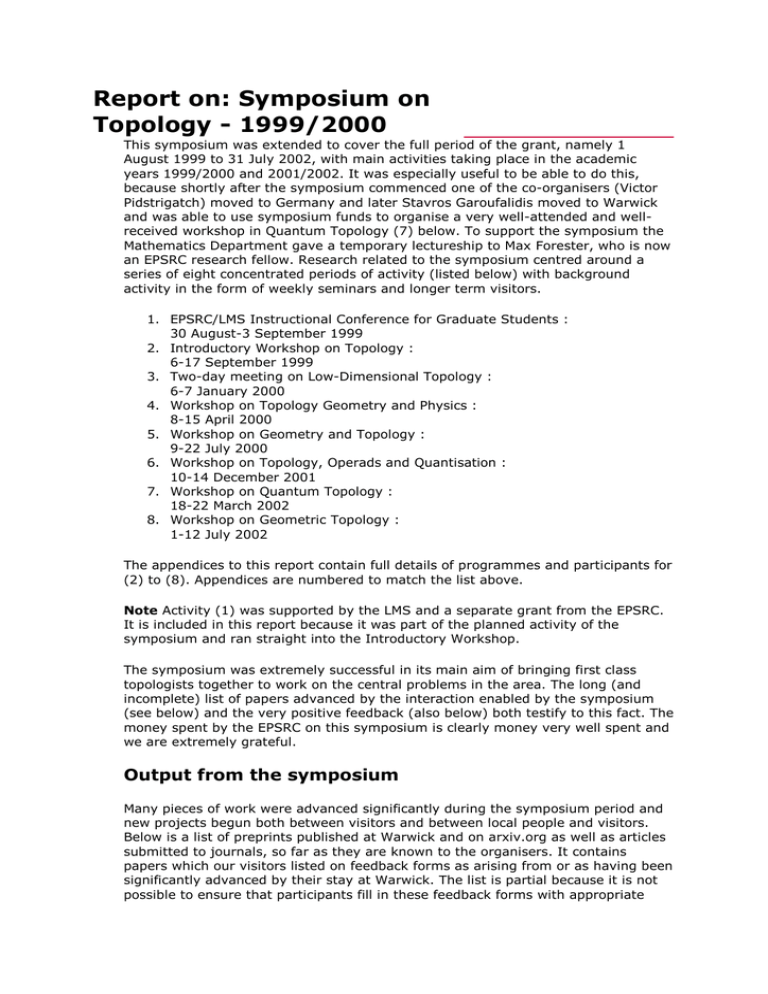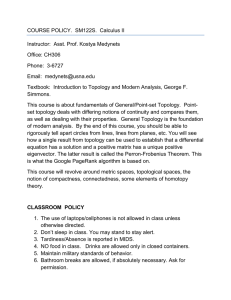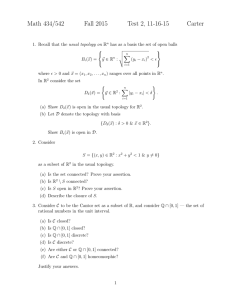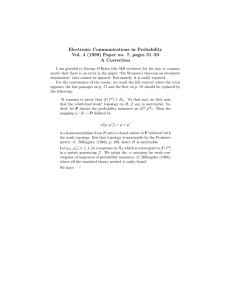Report on: Symposium on Topology - 1999/2000
advertisement

Report on: Symposium on
Topology - 1999/2000
This symposium was extended to cover the full period of the grant, namely 1
August 1999 to 31 July 2002, with main activities taking place in the academic
years 1999/2000 and 2001/2002. It was especially useful to be able to do this,
because shortly after the symposium commenced one of the co-organisers (Victor
Pidstrigatch) moved to Germany and later Stavros Garoufalidis moved to Warwick
and was able to use symposium funds to organise a very well-attended and wellreceived workshop in Quantum Topology (7) below. To support the symposium the
Mathematics Department gave a temporary lectureship to Max Forester, who is now
an EPSRC research fellow. Research related to the symposium centred around a
series of eight concentrated periods of activity (listed below) with background
activity in the form of weekly seminars and longer term visitors.
1. EPSRC/LMS Instructional Conference for Graduate Students :
30 August-3 September 1999
2. Introductory Workshop on Topology :
6-17 September 1999
3. Two-day meeting on Low-Dimensional Topology :
6-7 January 2000
4. Workshop on Topology Geometry and Physics :
8-15 April 2000
5. Workshop on Geometry and Topology :
9-22 July 2000
6. Workshop on Topology, Operads and Quantisation :
10-14 December 2001
7. Workshop on Quantum Topology :
18-22 March 2002
8. Workshop on Geometric Topology :
1-12 July 2002
The appendices to this report contain full details of programmes and participants for
(2) to (8). Appendices are numbered to match the list above.
Note Activity (1) was supported by the LMS and a separate grant from the EPSRC.
It is included in this report because it was part of the planned activity of the
symposium and ran straight into the Introductory Workshop.
The symposium was extremely successful in its main aim of bringing first class
topologists together to work on the central problems in the area. The long (and
incomplete) list of papers advanced by the interaction enabled by the symposium
(see below) and the very positive feedback (also below) both testify to this fact. The
money spent by the EPSRC on this symposium is clearly money very well spent and
we are extremely grateful.
Output from the symposium
Many pieces of work were advanced significantly during the symposium period and
new projects begun both between visitors and between local people and visitors.
Below is a list of preprints published at Warwick and on arxiv.org as well as articles
submitted to journals, so far as they are known to the organisers. It contains
papers which our visitors listed on feedback forms as arising from or as having been
significantly advanced by their stay at Warwick. The list is partial because it is not
possible to ensure that participants fill in these feedback forms with appropriate
care!
1. H Akiyoshi, M Sakuma, Comparing two convex hull constructions of cusped
hyperbolic manifolds (I), to appear in the Proceedings of the Workshop
``Kleinian groups and hyperbolic 3-manifolds'', held in Warwick, 2002,
London Math. Soc. Lecture Note Series, Warwick preprint 10/2002
2. H Akiyoshi, M Sakuma, M Wada, Y Yamshita, Comparing two convex hull
constructions of cusped hyperbolic manifolds (II), ibid, Warwick preprint
11/2002
3. H Akiyoshi, H Miyachi, M Sakuma, A refinement of McShane's identity for
quasifuchsian punctured torus groups, Warwick preprint 21/2002
4. Jorgen Ellegaard Andersen, Asymptotic faithfulness of the quantum SU(n)
representations of the mapping class groups, Invent. Math. to appear,
arXiv:math.QA/0204084
5. Ivelina Julianova Bobtcheva, Maria Grazia Messia, HKR-type invariants of 4dimensional thickenings and 2-dimensional CW-complexes,
arXiv:math.QA/0206307
6. S Boyer, B Wiest, D Rolfsen, Orderable 3-manifold groups, to appear
7. M Cahen, S Gutt, J Horovitz, J Rawnsley, Moduli space of symplectic
connections of Ricci type on $T^{2n}$; a formal approach, J Geom Phys, to
appear, arXiv:math.SG/0201167
8. John Crisp, Luis Paris, Artin groups of type B and D, to appear
9. John Crisp, Luis Paris, Representations of the braid group by automorphisms
of groups, invariants of links, and Garside groups, to appear
10. Mieczyslaw K Dabkowski, Jozef H Przytycki, Burnside obstructions to the
Montesinos-Nakanishi 3-move conjecture, Geom. Topol. 6(2002) 355-360,
arXiv:math.GT/0205040
11. Adam Epstein, Topological matings of quadratic polynomials, in preparation
12. Paul Feehan, PU(2) monopoles and 4-manifold invariants, to appear
13. R Fenn, M Jordan, L Kaufmann, The Birack: an Invariant of Virtual Knots and
Links, to appear
14. R Fenn, A Bartholomew, New Polynomials for (Virtual) Knots and Links, in
preparation
15. Roger Fenn, Colin Rourke, Brian Sanderson, The classification of classical
links, in preparation
16. Max Forester, On the isomorphism problem for generalized Baumslag-Solitar
groups, to appear
17. David Gabai, Smale conjecture for hyperbolic 3-manifolds: ${\rm
Isom}(M^3)\simeq{\rm Diff}(M^3)$, J. Differential Geom. 58 (2001) 113149
18. C McA Gordon, Dehn fillings of large hyperbolic 3-manifolds, J. Differential
Geom. 58 (2001) 263-308
19. C McA Gordon, Non-integral toroidal Dehn surgeries, to appear
20. C McA Gordon, DD Long, A Reid Surface subgroups of Coxeter groups, to
appear
21. Bill Harvey, Mustafa Korkmaz, Homomorphisms between mapping class
groups, in preparation
22. JDS Jones, On the definition of operads, to appear in Contemp Math. (2003)
23. Ebru Keyman, Ordering on singular braids, in preparation
24. Simon King, The size of triangulations supporting a given link, to appear,
Geom. Topol. 5 (2001), 369-398, arXiv:math.GT/0007032
25. Simon King, How to make triangulations of $S^3$ polytopal,
arXiv:math.GT/0009216
26. John Klein, Moduli of suspension spectra, to appear
27. John Klein, On embeddings up to homotopy in the sphere, to appear
28. Eun Soo Lee, The support of Khovanov invariants for alternating knots,
arXiv:math.GT/0201105
29. Brian Mangum, Theodore Stanford, Brunnian links are determined by their
complements, Algebr. Geom. Topol. 1 (2001) 143-152
arXiv:math.GT/9912006
30. Sergei Matveev, Special spines and an invariant of 4-manifolds, to appear
31. Paul Melvin, Blake Mellor, A geometric interpretation of Milnor's triple linking
numbers, submitted to Geom. Topol. arXiv:math.GT/0110001
32. Paul Melvin, Rob Kirby, Local surgery formulas for quantum invariants, to
appear
33. Justin Roberts, Simon Willerton, The Rozansky-Witten weight systems, to
appear
34. Justin Roberts, Justin Sawon, Simon Willerton, The Rozansky-Witten TQFT,
to appear
35. Colin Rourke, Knotted triangulations of the three-ball, in preparation
36. Colin Rourke, Brian Sanderson, The compression theorem II: directed
embeddings, Geom. Topol. 5 (2001) 431-440, arXiv:math.GT/003026
37. Colin Rourke, Brian Sanderson, The compression theorem III: applications,
for a preliminary version see section 5 onwards of
arxiv:math.GT/9712235:v2
38. Colin Rourke, Brian Sanderson, A proof of Eliashberg's folding theorem, in
preparation
39. Colin Rourke, Brian Sanderson, Adrian Varley, The $C^0$-singularity
theorem, in preparation
40. David Spring, Directed embeddings and the simplification of singularities,
Commun. Contemp. Math. 4 (2002) 107-144
41. Andras Stipsicz, Commutators, Lefschetz fibrations and the signature of
surface bundles, Warwick preprint 16/2000
42. Andras Stipsicz, Surface bundles: an interesting example, Warwick pre\-print
15/2000
43. Andras Stipsicz, A note on the transverse isotopy problem, Warwick pre\print 18/2000
44. A Voronov, Notes on universal algebra, Warwick preprint 26/2001,
arXiv:math.QA/0111009
45. Andreas Zastrow, Higher homology groups of planar sets do not behave
anomalously, to appear
46. Andreas Zastrow, Higher homology groups of subsets of surfaces do not
behave anomalously, to appear
Feedback from participants
Participants also used the feedback forms to make general comments about the
symposium activities and also (sometimes) to describe the research undertaken
here. There were no negative comments whatsoever. Here is a selection of
comments chosen for information or interest value.
"The enthusiasm of the lecturers focussed my attention on the talks. The
expertise of the lecturers was visible in every single talk." Graduate student
attending Instructional Conference
"The lecture were well prepared with the lecturers willing to answer
questions and go over material again when necessary." Graduate student
attending Instructional Conference
"The meeting was a welcome opportunity to learn at first hand of many
recent results in Topology." Andrew Ranicki, September 1999
"Great place, great conference." Stefan Bauer, April 2000
"Really great! The MRC provides excellent facilities. The workshop in
Geometry and Topology was extremely successful. Altogether a very
worthwhile visit." Cameron Gordon, June 2000
"A well-organised workshop on Topology and Geometry. I had a wonderful
time. The support staff at the Institute were always helpful and efficient. I
enjoyed working here during the workshop." David Spring, July 2000
"Great as usual." David Gabai, July 2000
"I enjoyed my stay at the MRC and it was very fruitful both because of the
good working conditions and the nice housing. The MRC houses are really
great, both the location and the interior of the houses are unique and
extremely nice." Andras Stipsicz, August 2000
"The workshop in Geometry and Topology was great fun and very inspiring."
Brian Magnum, July 2000
"Very nice conference and atmosphere." Oliver Dasbach, July 2000
"A very interesting conference on a high level." Simon King, July 2000
"Congratulations to the woderful staff, Mrs. McAllister, Colin Rourke, Victor
Pidstrigatch and John Jones for organising and running a great conference!"
Paul Feehan, July 2000
"The workshop helped the finishing of the paper by Andersen [4]. This is a
major result, which proves that the representation of the mapping class
groups (of a fixed but arbitrary genus) that comes from the TQFT $SU(N)_q$
(for all $N$ and $q$, a complex root of unity) is faithful. Josef (Przytycki)
used the workshop and the computing facilities at Warwick to simplify his
original proof (of [10])." Stavros Garoufalidis, March 2002
"The Workshop on Quantum Topology was very interesting: I have greatly
appreciated the talks, the opportunity to discuss with colleagues and the
hospitality of the Institute." Christian Blanchet, March 2002
"This meeting was a first class affair. I gave a talk on my current research
and this together with feed-back helped me to reformulate my ideas and
push them further. In addition three of my current students attended and
gained a great deal from the talks and ambience. Also one of my ex students
from Turkey attended and gave a talk." Roger Fenn, July 2002
"Part of the results of my second paper [9] were found after talking with
some knot theorists in Warwick." Luis Paris, July 2002
"I attended the workshop as a newcomer to the area of geometric topology.
I found the talks to be very interesting and well presented. While I have no
new results as a direct result of my participation, I feel that the conference
allowed me to get a feel for what is happening in the area and to meet the
many of the people working the area. I certainly feel that the workshop has
inspired me to research in geometric topology." James Cruickshank, July
2002
"The conference was, as always at Warwick topology meetings, very
smoothly organised and the atmosphere very conducive to both working
alone and, more importantly, to interacting with the other visitors and
locals." Justin Roberts, July 2002
"One thing I learned (from Colin Rourke and Martin Dunwoody's lectures) is
the basic idea behind the recognition problem of $S^3$ and the inherent
difficulty of an elementary approach to the PC. This is not likely, though, to
lead to any publication. I also had some new ideas inspired by James
Hughes' lecture on link homotopy and string links. In discussions with him
later, we realized that the groups involved in the Milnor, as well as LinHabegger approach to classifying links up to homotopy, are bi-orderable
groups!" Dale Rolfsen, July 2002
"During the workshop this summer, Rob Kirby and I continued our search for
a topological/combinatorial approach to Ozsvath-Szabo Floer homology of 3manifolds. In particular we are close to a combinatorial formula for the
Maslov index of certain holomorphic disks that arise in the theory, and we
spent our time investigating whether this formula (or some variant) is
consistent with known results on the Euler characteristic of the OSFloer
homology." Paul Melvin, July 2002
"The workshop was highly enjoyable compared to others I have been to. The
quality of the talks was uniformly very high. The wide range of topics meant
that I learned many new things. I met several colleagues for the first time. I
was glad to be able to talk about my work to an audience that had not heard
about it before. And high marks for the live entertainment!" Max Forester,
July 2002
"The second paper [46], as it is acknowledged by a footnote in the
appropriate preprint, has been inspired by discussions that I had with David
Spring during the first Warwick workshop.
Always having enjoyed my coming to Warwick, its unique discussion
atmosphere, and its permanently accessible computing- and printingnetwork." Andreas Zastrow, July 2002
"One of the problems I was studying at the time of the workshop (which has
now resolved itself into two shortly-to-surface preprints) is the question of
when a spectrum has the homotopy type of a suspension spectrum. The
results of this investigation are now being applied to study embeddings up to
homotopy of finite complexes $K$ in the $n$-sphere (here we are interested
in representing the functional stable dual $F(K,S^{n-1})$ as a suspension
spectrum)." John Klein, October 2002
"In the conferences on `Geometry, Topology and Physics' that took place in
Warwick in the year 2000 I began to understand techniques in topology that
were usefull for my Phd thesis (`Generalised Einstein Equations on Kähler
Manifolds', Imperial College, 2002).
The July 2002 conference was extremely interesting. In particular the talks
given by Fenn, Kirby, Rolfsen, Rourke and Sanderson (covering topics that
probably no one has ever thought as much as they had) were memorable.
The discussions that took place after and during the talks were enlightening
for me.
I am indebted to the organizers for setting up these conferences where
young mathematicians had the opportunity to learn and discuss with some of
the living legends in the subject." Daniel Pons, October 2002
Appendices :
Appendix 1: Flyer for 1999/2000 activities, flyer and programme for
EPSRC/LMS Instructional Conference, August 1999
Appendix 2: Programme and participants' list for Introductory Workshop on
Topology, September 1999
Appendix 3: Programme and participants' list for two-day meeting on LowDimensional Topology, January 2000
Appendix 4: Programme and participants' list for workshop on Topology
Geometry and Physics, April 2000
Appendix 5: Programme and participants' list for workshop on Geometry and
Topology, July 2000
Appendix 6: Flyer, programme and participants' list for workshop on
Topology, Operads and Quantisation, December 2001
Appendix 7: Flyer, programme and participants' list for workshop on
Quantum Topology, March 2002
Appendix 8: Programme and participants' list for workshop on Geometric
Topology, July 2002
Colin Rourke
Co-investigator
14 October 2002



